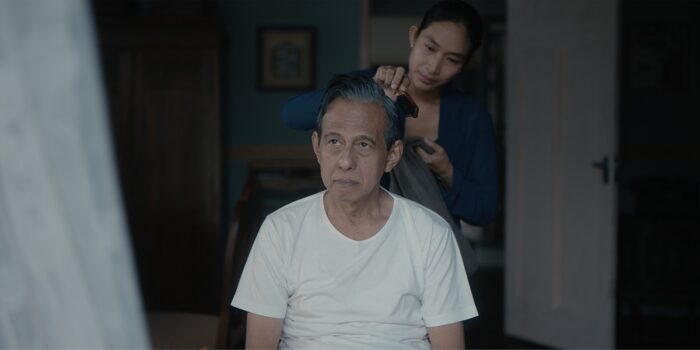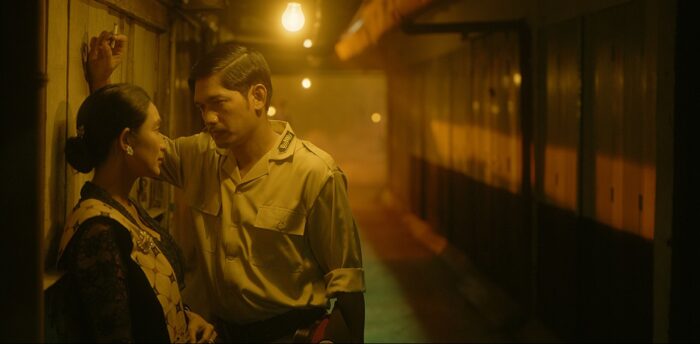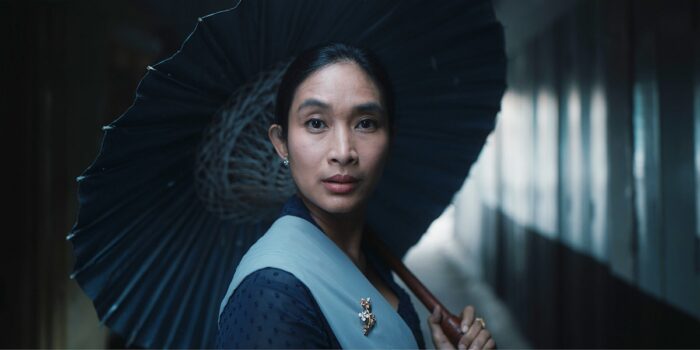Before, Now & Then—a beautifully complex, richly elegant melodrama from Indonesian writer-director Kamila Andini—is set against a backdrop of the political violence of the country in the 1960s, when anywhere from a half million to three million citizens were killed in the upheaval that led to the installation of President Suharto’s despotic three-decade rule. And while Before, Now & Then takes place in the wake of this genocide, its conflicts are for the most part intimate ones, set in the posh living rooms and boudoirs of a wealthy plantation home, where its protagonist dreams of a love long lost. With a measured performance from Happy Salma at its center, Andini’s film examines the infidelities faced and intimacies explored by its central protagonist.
Salma plays Nana, the wife of a wealthy plantation owner whose days are spent in luxurious, material comfort. She attends to her own beauty, the supervision of her home and servants, and to her three children. Her husband, referred to only as “Mr. Darga” (Arswendy Bening Swara) is distant, spending most of the time on his business affairs; when he is home, Nana attends to his hair as well, carefully washing and coloring it, but there appears to be no love between them. As the narrative develops, so do the reasons why.

Mr. Darga has found himself a mistress, a lovely young butcher named Ino (Laura Basuki) at the local market. He does not bother to hide his infidelities: he receives messages via a bicycle courier from Ino at his estate, invites Ino there unrepentantly, and even entrusts the care of his and Nana’s daughter Dais (Chempa Puteri) to her. His wealth and status in a patriarchal culture, it appears, afford him the convenience of extramarital affairs without consequence, and so he does not bother to hide, nor apologize for, his improprieties.
The women of Nana’s social circle blame Nana, and none too subtly, for these indiscretions. Were she of better origins, one says boldly in front of the others, she’d bear better-behaved children; and were she more attractive, she’d have no spousal infidelities to worry about. Nana bears these slights with a steely lip, rarely showing emotion. But she lives a rich emotional existence nonetheless, one haunted by her past, as she dreams of a love long ago lost, when her first husband (Ibnu Jamil) disappeared in the civil war and she was subsequently surrendered into marriage to the powerful Mr. Darga. Flashbacks (to the “Before” of the film’s title) of a younger Nana and dreams of what might have happened in a shared future with her one true love.

A shared intimacy evolves in the unlikeliest of places as Nana faces her current husband’s blatant infidelity and the near-total lack of emotional fulfillment in her plantation life. Both Nana and Ino, her husband’s mistress, suffer under the patriarchy of Indonesian rule. Nana is consigned to a genteel but emotionally bankrupt life of plantation leisure; Ino to slave away in the market until a better offer (mistress to a wealthy plantation owner) comes along. Yet between them, inspired by a shared love for little Dais, the two find a remarkable connection, an intimacy of ever-so-slightly-Sapphic shared secrets and sly smiles, one that Nana learns to embrace and that will, eventually, free her from her plantation prison.
Visually, Before, Now & Then is constructed and shot with all the care and skill of an Ophüls or Sirk. Its very first shot—a flashback sequence of Nana and her sister at the very moment she is sold into the arranged marriage to Mr. Darga—is a marvel of stunning composition, framing the two against the lush backdrop of Indonesian rainforest, its steamy fog setting slowly over the figures as Nana breastfeeds an infant Dais and fears for her life. Shots in the film’s “Now” are equally carefully composed, with the plantation home’s architecture forming a battalion of gates, doorways, arches, and borders that close Nana off from human connection. Andini and her DP Batara Goempar and Production Designer Vida Sylvia know how to block and frame every element, every movement, to isolate Nana from others around her—and then later connect her to Ino and, later, Dais, in meaningful and visually complex sequences.
The soundtrack too is a delight, with original music from Ricky Lionnardi creating a lush, swanky, tropical sixties vibe alternating with period Indonesian radio hits. Above all, though, is Happy Salma’s performance as Nana, from the fresh young farm daughter/mother of the opening scene to the put-upon plantation housewife seeking an emotional release. Salma glides with a leonine grace and conveys volumes of interior feeling with a slight arch of brow or curl of lip. Onscreen for nearly every moment of the film, her character is reserved by nature, keeping secrets in the tightly coiled coif of her ever-present updo, but rich in an emotional turmoil in need of release. Well established as a model and actress in her native Indonesia, Salma seems poised for the level of international stardom afforded a Penelope Cruz or Juliette Binoche. She’s that good.

Before, Now & Then has appeared at dozens of international film festivals, including Berlin International, where Laura Basuki won Best Supporting Actress, as well as Sydney, Chicago, and others. The film is Andini’s fourth feature, and with it continues her focus on the lives of women under patriarchal rule. It is a slow burn, perhaps too slow for American audiences weaned on fast pace and big effects, but Before, Now & Then is rich and insightful in its characterization of the oppressions women face, not just in Indonesia, and not just then, but also before, and now.
Before, Now & Then debuts theatrically in the U.S. August 25, 2023 at the Brooklyn Academy of Music Theater, with additional markets to follow. In Indonesian with English Subtitles, 103 minutes.




